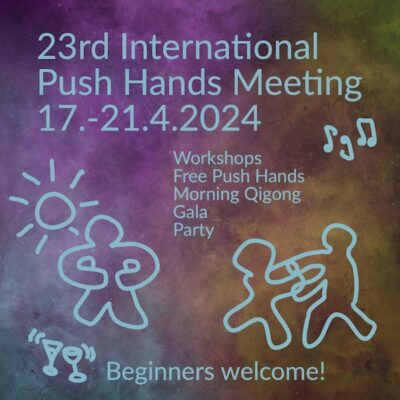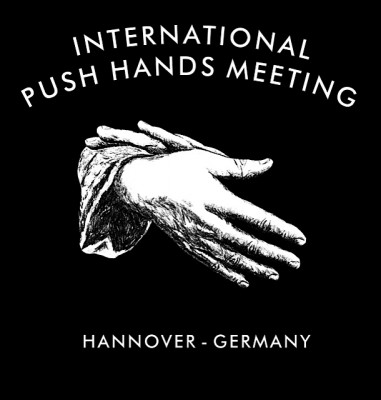The teachers of the 17th International Push hands Meeting in Hannover were coming from Germany, UK, Hong Kong, Poland und Austria:
Barry McGinlay, Jo Augustin, Yonghui Deistler-Yi, Yang Yunzhong, Jo Augustin und Tomasz Nowakowski.
| Room 1 | Room 2 | Room 3 | Room 4 | |
| Wednesday, 19.04.2017 |
Barry McGinlay | Yonghui Deistler-Yi | Tomasz Nowakowski | |
| Thursday, 20.04.2017 |
Barry McGinlay | Yonghui Deistler-Yi | Tomasz Nowakowski | |
| Friday, 21.04.2017 |
Barry McGinlay | Yonghui Deistler-Yi | Yang Yunzhong | |
| Saturday, 22.04.2017 |
Barry McGinlay | Jo Augustin | Yang Yunzhong | |
| Sunday, 23.04.2017 |
Barry McGinlay | Jo Augustin | Yang Yunzhong |
Barry McGinlay
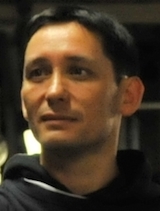 Barry is a World Tai Chi champion, Gold medalist pushing hands in the world famous Taiwan world championship and European Gold medalist, and has coached International World, European and National tai chi champions. He is a trailblazer for tai chi in the UK.
Barry is a World Tai Chi champion, Gold medalist pushing hands in the world famous Taiwan world championship and European Gold medalist, and has coached International World, European and National tai chi champions. He is a trailblazer for tai chi in the UK.
He is certified as an Advanced Instructor by the Tai Chi Union for Great Britain (TCUGB) and as an Instructor of the Longfei Taijiquan Association of Great Britain. Barry is taught Tai Chi by Master Simon Watson, Master Richard Watson, Master Wang Yanji, Professor Li Deyin, Master Faye Li Yip and Master Tary Yip under the lineage of Master Li Tianji.
With over 30 years of experience, Barry is dedicated to teaching all aspects of martial arts and has been a Tai Chi and Qigong practitioner for 18 years. He is a full time professional martial artist and teaches internal and external?martial arts to a diverse range of students. He also teaches internationally and organises workshops and retreats in England, Thailand, Cambodia and China. These trips combine experiences of Eastern culture and philosophy with Tai Chi and Qigong training. All of these events have been popular and successful.
Being active within the London Chinese community, Barry has built strong links through teaching Tai Chi and Qigong, and from participating and performing at their cultural events. He is interested in the fusion of the performing arts and martial arts and has studied at the traditional school of Beijing Opera in China, and amongst other projects, has collaborated with professional dance choreographers to bring Tai Chi to the stage.
Barry works consistently within the local community. He has worked with children with special needs and behavioural issues, and students with medical conditions, including recovering cancer patients and students with heart-related conditions.
He has a very hands-on approach to his teaching practise and is dedicated to teaching the self empowerment that is generated within the individual’s learning experience. He focuses on one-to-one attention for individual and specific needs and encourages all students to explore new boundaries and so reach their full potential.
Theme: A 5 day introduction course for beginners in Tai Chi pushing hands –
come and learn the essence of Tai Chi partner work!
Over the 5 days we will cover
solo exercises
, partner and group work.
You will be challenged in every way… to have fun!
Train with passion and be very focused but at the same time relaxed.
Whether you are a beginner or a teacher: in this 5 days you will come away full of energy with the joys of pushing hands.
Barry’s “The Love Boot camp ❤️”
Boot Camp 90 mins in the morning! A mix of stretching, strengthening Qigong and pushing hands!
Yonghui Deistler-Yi
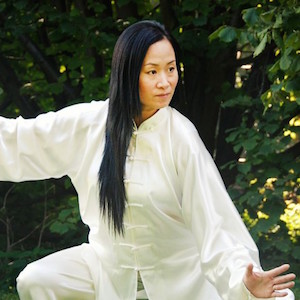 Since her childhood Yonghui has been fascinated by the Chinese martial arts. She made her first contact with them at school. Her focus is Taijiquan, but she also has knowledge in Fujian Bai He Quan (white crane style) and in Tanglangquan (Praying Mantis style) – the style of her hometown, Yantai. She learned from teachers as Lau Kung King, Yek Giong and Hao Cong. Since 2011 she has been close student of Master Wang Lian Yu. In the weapon arts her priorities are sword and fan. She learned Qigong with masters such as Li Zhi Zhang, Zhang Guangde, Li Xiaoqiu, …
Since her childhood Yonghui has been fascinated by the Chinese martial arts. She made her first contact with them at school. Her focus is Taijiquan, but she also has knowledge in Fujian Bai He Quan (white crane style) and in Tanglangquan (Praying Mantis style) – the style of her hometown, Yantai. She learned from teachers as Lau Kung King, Yek Giong and Hao Cong. Since 2011 she has been close student of Master Wang Lian Yu. In the weapon arts her priorities are sword and fan. She learned Qigong with masters such as Li Zhi Zhang, Zhang Guangde, Li Xiaoqiu, …
From 83 -90 she studied at the Art School / School of Painting and Applied Arts in China. In Vienna, she graduated from the master class in oil painting with Prof. Hutter and Hundertwasser at Vienna (90-96). Since 1988 numerous publications in art magazines and periodic exhibitions in China and Austria. Teaching at the Liao Ning art school in China, and director of numerous courses in Vienna. Employment with new expression methods for traditional techniques of Chinese ink painting and calligraphy. 2016 calendar design with Wang Ning for Taiji & Qigong Journal , in cooperation with Taiji Europe .
Currently Yonghui teaches Taijiquan, Qigong, weapons, and trad. Chinese painting.
Theme: Taijiquan – The interplay of structure and releasing
If Taijiquan is broken down into its components, mostly two things remain. Structure and releasing (song), in both physical and mental processes. The body needs structure, i.e. an erection to be able to let coordinated movement arise. It will be properly effective only by releasing into these structures. This creates rootedness and active compounds through which we can neutralize (Jin) and release forces. Even mentally it needs a clear focus (Yi) to successfully carry out the respective tasks. But if this too rigid, we lose our ability to change. Therefore, it also needs on the mental plane, a release from the intention.
This crossing – over workshop will be based on some solo – and partner exercises to illuminate this core issue. With these mechanisms, we come to a better understanding of the basic forces and the various possibilities of application in Taijiquan.
The exercises can then be easily integrated into any training system.
Tomasz Nowakowski
lives in London, where is the centre of his Tai Chi School. He regularly leads workshops in different countries including Austria, Czech Republic, France, Germany, Italy, Poland, Slovakia, Taiwan and United Kingdom.
He is working at his own school as well as for companies, cultural and educational institutions, for example: Musique at Danse en Bretagne and Association enCo.re France, Fine arts Academy Warsaw, International Tai Chi Chuan Federation of Taiwan, Bacopa Bildungszentrum Austria, and others.
He is one of the earliest and the closest European students of master Ming Wong C.Y.; and in the time of teaching master Ming style over 25 years, Thomas has spread this unique, family style to many countries.
From early age Thomas has been passionated about fencing (swordsmanship), its history and methodology of practice.
Since 1966 he has practiced, studied and researched different martial arts: Ju-jitsu, Judo, swordsmanship, Kendo, Aikido, Karate, Kung fu as well as Do In (Tao Yin) and Yoga.
Thomas has been teaching Tai Chi Chuan and Qi Gong since 1982.
He founded his Tai Chi School in Prague in 1989 and in Austria in 1990.
In 2007 he has moved the centre of his school to London, where he has part of his family roots.
Thomas was a judge at 7th Chung Hwa Cup International Tai Chi Chuan Championship at Taiwan in 2004.
He is co-founder International Push Hands meeting in Prague.
He has been training teachers of Tai Chi and Qi Gong in his own school as well as he trained Qi gong teachers in the PGA Austria over seven years. He translated master Cheng Man Ching’s book, The Thirteen Treatises on Tai Chi Chuan to Polish, published in 2009.
He has been researching methodology of teaching and practicing and on the base these experiences he has been developing his “Shapes of Balance” teaching system.
He’s professional expertise is in the areas of methodology of practice programmes for groups as well as for individuals, working on the development of Ting jin (feeling), balance of structure, timing, conscious movement and practical applications of principles of Tai Chi.
links: http://www.taichi-goldenhill.info, https://shapesofbalance.com, http://www.push-hands.cz
Themes:
“When you understand a technique, you know a technique. When you understand a concept, you know a thousands of techniques.” Understanding concepts is the core of Thomas’ practice and research Tai Chi and other systems as well as his Shapes of Balance teaching system. The main topic of the workshop is practical research a concept of 13th Fundamental Forms Tai Chi in individual practice and applications with a partner. The work with timing, coordination and awareness of movement and balance of structure body. The role of the mind intention in emission 13 Basic forms of kinetic energy (internal force) in different variations of tui shou and practical applications of Tai Chi techniques. Exercises for develop “listening” (ting jin) and “Interpretation” (Dong jin), conscious feeling: balance, intention and quality force of partner. Practice parts of The Nine Small Havens (Nei Gong form), and study the role of Nine Small Havens (nine groups of body joints) as energy and movement centres. Practical applications principles of Tai Chi in work with partner. The workshop is for beginners as well as for advanced practitioners. Thomas will lead the workshop in English and German.
Yang Yunzhong
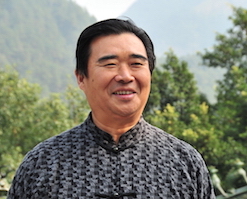
Yang Yunzhong, born in 1962 in the province of Shanxi, has worked as a medical doctor for 10 years, before he chose the path of Taijiquan and Qigong. On his way he met many well-known masters, among them Pang Ming (Hunyuangong/Zhineng Qigong), Feng Zhiqiang (Chen-Style Hunyuan Taijiquan), Ti Enfang (Cheng-Style Baguazhang), Wei Shuren (Yang-Style internal Taijiquan) and Wang Zhuanghong (Water-Style Taijiquan), who named him as his successor. In 2009 Yang Yunzhong founded the »Institute of Chinese Taiji-wisdom« and developed his own style further as Rushi Taijiquan. The encounter with Wang Zhuanghong inspired him to interconnect his Taijiquan with the essence of Chinese religions and philosophies and to understand this precious heritage of China as comprehensive cultural work. Due to the inspiration of his master, Yang Yunzhong wrote four books about Taijiquan which all bear »Xin« – the heart – in the title: The Transmission, The Enlightenment, The Language and The Conclusion of the Taiji-Heart. With »Taiji Ba Fa« – the eight basic forms – and the Taiji-stick he wants to create a basis for Taiji practitioners. The special focus of his teaching lies on the connection between the external of the physical and the internal of the energetics.
Themes:
Friday, 21.4.
1. Short introduction into Water Taiji
2. Illustration of “Chi Shu” – Awakening of the Qi
3. Push Hands application of “Dian” – point, “Xieng” – line, “Mien” – surface/area and “Tii” – space (body) and of sinking and rising according to the principles of the water element
Saturday, 22.4.
1. The meaning of the center in Taiji
2. Application of the eight basic techniques – the four linear techniques of Peng, Rui, Jie, An
Sunday, 23. 4.
1. Exemplification of the heart connection in Taiji
2. Application of the eight basic techniques – the four diagonal techniques of Chai, Lie, Juo, Kau
3. The techniques in practice – Making contact, sticking, binding, following and the composition thereof
Jo Augustin
 Jo Augustin (Dao Name: Zhou Xing Dao)
Jo Augustin (Dao Name: Zhou Xing Dao)
1987 – 2006 Chan Shaolin Si / Since 1990 Taijiquan and Qigong / 1996-2000 Education in Yi Qi Gong by Master Zhi Chang Li and Roland Neumann
1996 Opening the Zhang Sanfeng Wuguan in Mülheim
2003 – 2004 Education in Tuina therapy by Annette Jonas / Since 2004 lessons with Master Tian Liyang with annual visits to Wudang Shan / China
2014 official representative of Wudang Pai in the 16th generation (Line name Zhou Wei He)
Taijiquan – Xingyi – Bagua – Xingyiquan
Theme: On Yin Yang follows – lead the Energie around the Center
Applications in Taijiquan
A little insight in Xingyiquan
Wang Ning
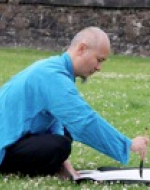 Biography: calligrapher, seal cutter, translator and Tai Chi teacher – studied German literature and language in Peking. Thanks to his experience he is able to build bridges between the Chinese and Western worlds of thought and emotion. We will receive an introduction to the (philosophical) foundations of the movement arts of Tai Chi Chuan and Qigong — not through a dry and theoretical lecture, but as the calligrapher paints the image-based concepts of the Chinese world view. These concepts are hidden in the Chinese characters, and their interpretation takes us on an exciting journey through China’s cultural history. This often leads to new and surprising meanings which are quite different to the normal correspondences and translations used in the West.
Biography: calligrapher, seal cutter, translator and Tai Chi teacher – studied German literature and language in Peking. Thanks to his experience he is able to build bridges between the Chinese and Western worlds of thought and emotion. We will receive an introduction to the (philosophical) foundations of the movement arts of Tai Chi Chuan and Qigong — not through a dry and theoretical lecture, but as the calligrapher paints the image-based concepts of the Chinese world view. These concepts are hidden in the Chinese characters, and their interpretation takes us on an exciting journey through China’s cultural history. This often leads to new and surprising meanings which are quite different to the normal correspondences and translations used in the West.
Ning will be arround at the free pushing hands sessionscutting seals and is happy to answer your questions about the philosophy of Taijiquan.
